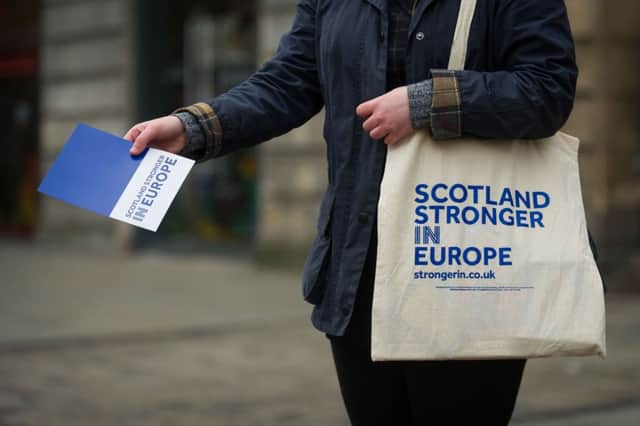EU referendum: Business leaders warn UK already being damaged


The Confederation of British Industry (CBI) cut its growth forecasts and said the 23 June vote is beginning to put a stop to investment. The business group’s latest quarterly forecast predicts the UK will see 2 per cent GDP growth in both 2016 and 2017, down from 2.3 per cent and 2.1 per cent respectively.
Meanwhile, the Scottish Retail Consortium (SRC) blamed uncertainty over EU membership for a declining footfall in Scotland’s shops, with a 6.2 per cent drop in numbers in April compared with the same month last year. Analysts highlighted poor weather, a rise in unemployment and “uncertainty in this pre-EU referendum period” as factors in the fall.
Advertisement
Hide AdAdvertisement
Hide AdThe warnings came after Bank of England governor Mark Carney revealed a Brexit vote could trigger a possible “technical recession” and see the pound plunge in value. A report today by the CBI warned growth is expected to be driven by household spending and investment, but the deterioration in the Brexit vote and the global economic outlook represent “major challenges”.
The business group said that Brexit uncertainty is now having a “tangible impact” on the spending plans of some firms.
CBI director general Carolyn Fairbairn said: “A dark cloud of uncertainty is looming over global growth, particularly around weakening emerging markets and the outcome of the EU referendum, which is chilling some firms’ plans to invest.
“At present, the economic signals are mixed. We are in an unusually uncertain period.”
The CBI believes that the timing of a first rise in interest rates – which have been held at 0.5 per cent since 2009 – will now be in the second quarter of 2017, rising to 0.75 per cent.
Rain Newton-Smith, CBI economics director, added: “Referendum uncertainty also appears to be dampening some activity in the near-term, and so put altogether, we do not now expect to see a rise in interest rates before 2017.”
Despite the decline in footfall in Scotland’s shops, the impact on overall sales is not known.
Diane Wehrle, marketing and insights director at retail body Springboard, said: “April’s footfall figures certainly echo the high street decline seen over recent months, which can be attributable to the poor weather for this time of year, but with digital sales and retail parks also slowing down it signifies something more at play.
Advertisement
Hide AdAdvertisement
Hide Ad“The rise in unemployment and economic uncertainty in this pre-EU referendum period has undoubtedly adversely impacted consumer activity. We know that cuts in retail spending are the first line of defence against threats to household budgets when consumer confidence is knocked.”
Appearing on BBC One’s The Andrew Marr Show, Mr Carney yesterday insisted he was not entering into the wider referendum debate but that the bank had a duty to explain potential risks to the economy.
“We don’t just have a responsibility to be fair and not pop up after the vote and say ‘Oh by the way this is what we thought at the time’ but we also have a responsibility to explain risk and then take steps, because by explaining what we would do to mitigate them we reduce them. That is the key point – ignoring a risk is not to reduce it,” he said.
“If we’re taking a judgment as a committee and changing policy because of it, we’re putting out billions of pounds of liquidity facilities – we’re getting banks to raise capital against these type of risks. If we are potentially going to change the path of interest rates or other instruments of monetary policy because of certain things manifested, we have a duty to explain that to the British people and to parliament.”
Former work and pensions secretary Iain Duncan Smith – who is campaigning for Leave – challenged Chancellor George Osborne to release details of any communications between the Treasury and the bank, including emails and telephone calls, ahead of the publication of its report.
Mr Duncan Smith also questioned whether the Chancellor was involved in arranging for the head of the IMF, former French finance minister Christine Lagarde, to release her report warning of the dangers of Brexit the following day.
He said: “Is it a surprise suddenly on Thursday then followed by Friday you have two reports coming out? Do you think they told each other or talked to each other about what they were doing? I wonder about that.
“The one continuum in all of this is of course the Chancellor who is out immediately supporting the governor and he then sits beside Christine Lagarde and when she gets up she openly thanks him and the Treasury for their assistance in making their report.”
Advertisement
Hide AdAdvertisement
Hide AdMr Duncan Smith, who used to sit alongside Mr Osborne in the Cabinet, echoed other Leave campaigners in suggesting that Mr Carney had breached his duty of impartiality.
“I think the governor has strayed now into the expression of what is a simple, personal prediction. If you are going to be impartial you’d better be impartial,” he said.
“He used to work for Goldman Sachs. We see Goldman Sachs running all the way through this. They are funding the Remain campaign and I am told by those who know him that he has always been very keen on the whole European project.”
Mr Duncan Smith acknowledged that none of the major economic authorities had supported the case for leaving the EU.
“It would be completely unusual for all of these institutions not to want to back the status quo,” he said.
Also on Marr, Northern Ireland First Minister Arlene Foster, who backs Leave, rejected suggestions leaving the EU could harm relations with the Republic of Ireland or damage the peace process.
“The peace process is not built on the European Union,” she said.